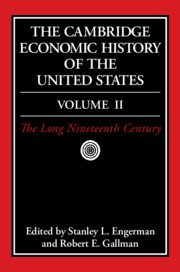Book contents
- Frontmatter
- 1 Economic Growth and Structural Change in the Long Nineteenth Century
- 2 The Economy of Canada in the Nineteenth Century
- 3 Inequality in the Nineteenth Century
- 4 The Population of the United States, 1790–1920
- 5 The Labor Force in the Nineteenth Century
- 6 The Farm, The Farmer, and The Market
- 7 Northern Agriculture and the Westward Movement
- 8 Slavery and its Consequences for the South in the Nineteenth Century
- 9 Technology and Industrialization, 1790–1914
- 10 Entrepreneurship, Business Organization, and Economic Concentration
- 11 Business Law and American Economic History
- 12 Experimental Federalism: the Economics of American Government, 1789–1914
- 13 Internal Transportation in the Nineteenth and Early Twentieth Centuries
- 14 Banking and Finance, 1789–1914
- 15 U.S. Foreign Trade and the Balance of Payments, 1800–1913
- 16 International Capital Movements, Domestic Capital Markets, and American Economic Growth, 1820–1914
- 17 The Social Implications of U.S. Economic Development
- Bibliographic Essays
- Index
- References
11 - Business Law and American Economic History
Published online by Cambridge University Press: 28 March 2008
- Frontmatter
- 1 Economic Growth and Structural Change in the Long Nineteenth Century
- 2 The Economy of Canada in the Nineteenth Century
- 3 Inequality in the Nineteenth Century
- 4 The Population of the United States, 1790–1920
- 5 The Labor Force in the Nineteenth Century
- 6 The Farm, The Farmer, and The Market
- 7 Northern Agriculture and the Westward Movement
- 8 Slavery and its Consequences for the South in the Nineteenth Century
- 9 Technology and Industrialization, 1790–1914
- 10 Entrepreneurship, Business Organization, and Economic Concentration
- 11 Business Law and American Economic History
- 12 Experimental Federalism: the Economics of American Government, 1789–1914
- 13 Internal Transportation in the Nineteenth and Early Twentieth Centuries
- 14 Banking and Finance, 1789–1914
- 15 U.S. Foreign Trade and the Balance of Payments, 1800–1913
- 16 International Capital Movements, Domestic Capital Markets, and American Economic Growth, 1820–1914
- 17 The Social Implications of U.S. Economic Development
- Bibliographic Essays
- Index
- References
Summary
Within broad limits business law always has been instrumental to American economic development. J. Willard Hurst’s classic formulation characterized nineteenth-century law and the conditions of freedom as permitting a release of middle-class entrepreneurial energy. Elaborations of this idea stressed that law encouraged dynamic rather than traditional uses of property, often favoring capitalist exploitation of weaker groups. Emphasizing the importance of incentives in the operation of economic markets or political and legal systems, Douglass C. North recognized, by contrast, that imperfect information, transaction costs, and other factors brought about outcomes that often were neither optimal nor even beneficial to those who purportedly sought such results through manipulation of the rules of the game. Thus according to North, the institutional framework underlying the impressive economic growth of the nineteenth-century United States provided incentives for individual and group action that resulted in a mix of economically productive and adverse outcomes. Groups pursued contrary views of self-interest in part because ideological conflicts fostered opposing perceptions of property rights. Perhaps the most significant instance in which interest-group and ideological struggle followed an unpredictable course was the clash between Democrats and Republicans that culminated in the Civil War. Yet to a certain extent, in the nineteenth-century American economy such clashes were endemic.
- Type
- Chapter
- Information
- The Cambridge Economic History of the United States , pp. 435 - 482Publisher: Cambridge University PressPrint publication year: 2000
References
- 4
- Cited by

